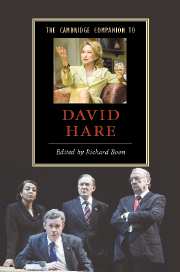Book contents
- Frontmatter
- Introduction
- Part I Text and context
- 1 Portable Theatre: ‘fine detail, rough theatre’
- 2 Keeping turning up
- 3 In opposition
- 4 Hare’s trilogy at the National
- 5 Hare’s ‘stage poetry’, 1995-2002
- 6 ‘Stopping for lunch’
- Part II Working with Hare
- Part III Hare on screen
- Part IV Overviews of Hare
- Selected Bibliography
- Index
4 - Hare’s trilogy at the National
Private moralities and the common good
from Part I - Text and context
Published online by Cambridge University Press: 28 April 2008
- Frontmatter
- Introduction
- Part I Text and context
- 1 Portable Theatre: ‘fine detail, rough theatre’
- 2 Keeping turning up
- 3 In opposition
- 4 Hare’s trilogy at the National
- 5 Hare’s ‘stage poetry’, 1995-2002
- 6 ‘Stopping for lunch’
- Part II Working with Hare
- Part III Hare on screen
- Part IV Overviews of Hare
- Selected Bibliography
- Index
Summary
David Hare's trilogy of plays - Racing Demon (1990), Murmuring Judges (1991) and The Absence of War (1993) - comprise a mid-career capstone, the culminating expression of the writer's abiding interest in private conduct and the public weal. Sweeping in scope, dialectical in tone, these works confirm Hare as one of Britain's most accomplished playwrights. If one, however, considers the drama that would soon follow on the English stage - the volatile, terse and often obscene theatre of Ravenhill, Kane, Crimp, Penhall et al. - Hare can appear rather conventional, the established writer of what Martin McDonough would describe as a 'dull and political and lecture-y' kind of drama. While comparison between Hare's work and that of the 'in-yer-face' writers reveals vast differences in style, Hare's trilogy ventures into a moral space that a dramatist such as Ravenhill might recognise and affirm. Hare's trilogy exposes a collapse in Britain's national life in the last decade of the millennium. And, like the writers of Ravenhill's generation, he interrogates the nature (and possibility) of ethical action in this world adrift.
- Type
- Chapter
- Information
- The Cambridge Companion to David Hare , pp. 64 - 78Publisher: Cambridge University PressPrint publication year: 2007
- 2
- Cited by

